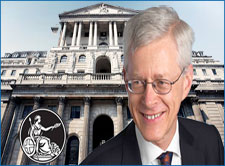
Bank of England policymaker Martin Weale shifted his monetary policy stance after the release of negative business survey results and now favors an immediate stimulus to the economy.
"I see things rather differently from what I would have done had we not had those numbers and the material point is that they were collected after July 12, so after the initial shock of the referendum," Weale said in the interview with the Financial Times.
In the June 23rd referendum, 52 percent Britons opted to leave the European Union in a surprise move.
In a speech last week, the policymaker said the uncertainty from "Brexit" suggested waiting for firmer evidence before taking any action. He also rejected the argument that markets would be disappointed were there to be no easing in August.
"What I said last week is that I would like more information as well as more reflection and I have had more information. Although you can't say there's a clear signal, if you spend all the time waiting for a clear signal, it never comes," said Weale.
As monetary policy works with a delay, even an action in August is unlikely to give quick boost to the economy, he added.
"If we're talking about having an effect by the end of the year, there is very little that the bank can do," Weale said.
The BoE rate-setter is set to step down on August 8, ending his second three-year term.
At the July meeting, the BoE refrained from cutting interest rate, while markets widely waited for easing. Only Gertjan Vlieghe sought a reduction in rate among the nine member monetary policy committee.
The bank is expected to ease its policy at the August meeting after assessing the forecast for consumer prices and economy from the Inflation Report to be released on August 4.
BoE's Chief Economist Andrew Haldane earlier said a "material easing of monetary policy" is likely to be needed, as soon as August, as one part of a collective policy response aimed at helping protect the economy and jobs from a downturn.
According to Industrial Trends survey from the Confederation of British Industry, business confidence plunged to its lowest level in seven-and-a-half years, after the surprise "Brexit" vote.
The number of firms citing political/economic conditions abroad as a constraint on export orders in the coming three months rose to a thirty three year high, the survey revealed.
A closely-watched survey by Markit showed last week that the U.K. private sector activity contracted at the steepest pace since early 2009, post-Brexit.
by RTT Staff Writer
For comments and feedback: editorial@rttnews.com
Business News

